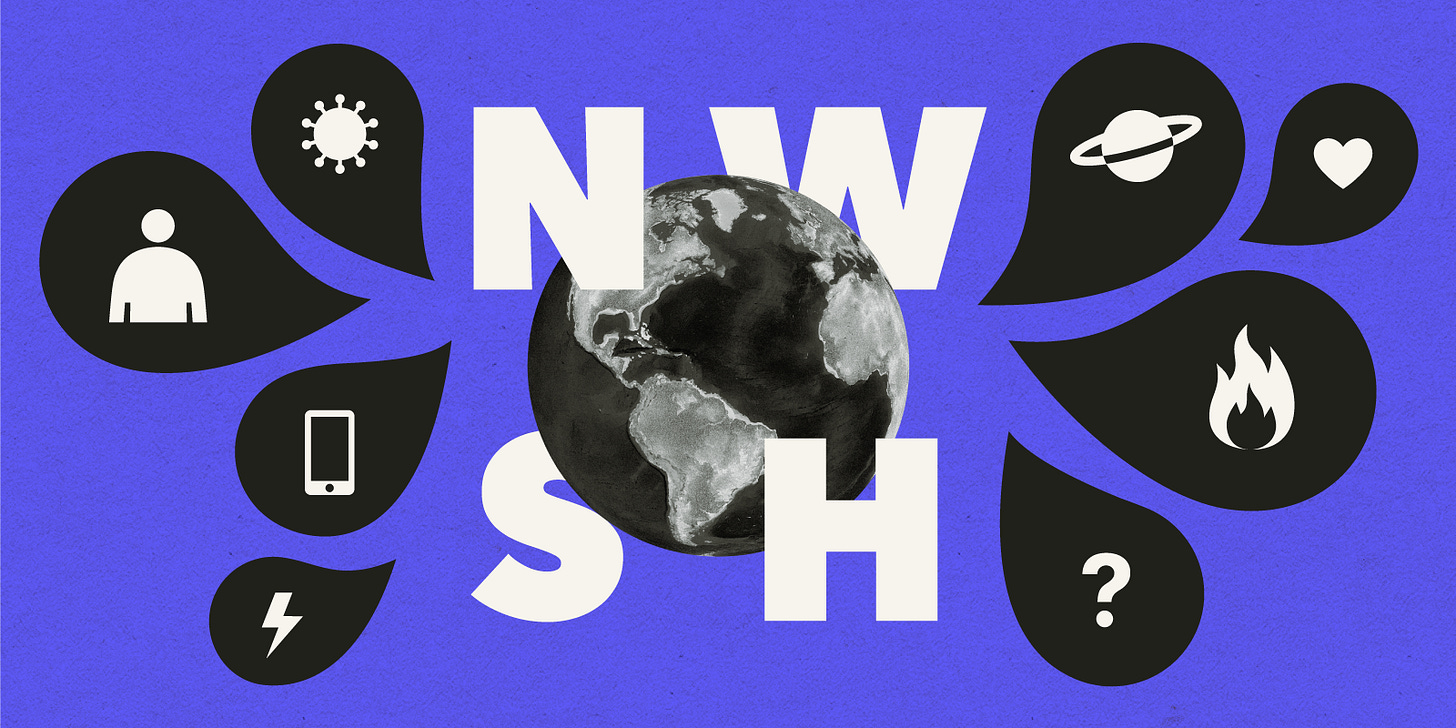New Week Same Humans #59
Microsoft go to war over the metaverse. Researchers teach an AI common sense ethics. Plus more news and analysis from this week.
Welcome to the mid-week update from New World Same Humans, a newsletter on trends, technology, and society by David Mattin.
If you’re reading this and you haven’t yet subscribed, join 19,000+ curious souls on a journey to build a better shared future 🚀🔮
💡 In this week’s Sunday note I wrote about outer space, virtual worlds, and the true final frontier. Go here to read Out of This World.💡
This week, Microsoft sets itself on a collision course with Meta over the future of work.
Also, the CCP tells Big Tech how things are going to be from now on. And researchers teach an AI some common sense ethics.
Let’s go!
💥 The metaverse wars
This week at its annual Ignite event, Microsoft launched its vision of the metaverse.
Specifically, it’s a vision of metaversal work. Microsoft are integrating their Mesh virtual reality platform into the ubiquitous MS Teams, allowing for, says CEO Satya Nadella, ‘a shared, immersive experience’.
At the basic end, this will mean the ability to show up in Teams calls as a custom-made 3D avatar. No need to switch your webcam on; Teams will use AI to listen to your voice and animate your avatar accordingly.
But in time, Teams will incorporate fully immersive VR rooms, where colleagues can hold meetings, give presentations, and hang out.
⚡ NWSH Take: A virtual elephant loitered in the room at Ignite. The flashy launch came days after Facebook rebranded as Meta, and the Zuck announced that his company will put the metaverse at the heart of everything it does. Meta recently launched its own virtual meeting space platform, Horizon Workrooms. // In the wake of all this, some have been quick to dismiss the metaverse as hype. I’m not so sure. An embodied internet can transform the way we play, work, and learn. And shared virtual spaces have the potential to restore the Chit Chat Economy: the informal chat and serendipitous encounters that fuel team creativity and innovation. Some organisations have already embraced that potential; check out the Animal Horizon-esque virtual world that Shopify made for its employees. // The inescapable conclusion here? Meta and Microsoft are on a collision course. A war to own the next iteration of the internet is beginning, and the future of work will constitute crucial terrain. Ready your avatar, and strap in.
🇨🇳 Algorithms in one country
This week saw a further evolution of the testy relationship between Big Tech and the Chinese state.
The CCP announced new guidelines for ‘super-large technology platforms’, defined as those having more than 500 million users and a market value of more than 1 trillion yuan. Those platforms, said the State Administration for Market Regulation, should not collect user data without consent, and must be transparent about algorithmic recommendation of products and services, among other injunctions.
Those guidelines echo new data legislation, passed this week, which tighten rules around collection of data and the transferal of data beyond Chinese borders.
Meanwhile, this week saw further signals that western tech companies are struggling with the new operating environment. Yahoo announced their withdrawal from the country on Monday. Epic Games have just announced that they will shut down the Chinese version of Fortnite on 15 November; that move comes in the wake of strict new rules that limit video gaming time for under-18s.
⚡ NWSH Take: These new ‘guidelines’ are in keeping with the CCP’s plans, which I’ve written about often, to harness the power of Big Tech to create a new kind of 21st-century technostate. // Chinese technology companies must comply. Those from the Global North have a choice to make; Yahoo and Epic Games have made theirs. LinkedIn also withdrew last month, citing censorship laws. // The broader context here? Back in Algorithms with Chinese Characteristics, I wrote about the two forms of algorithmic governance emerging around us. In the Global North, national governments are searching for a new settlement that allows the state to coexist alongside the strange form of socio-corporate power now wielded by Big Tech. Meanwhile, the CCP seeks no such settlement: they intend to conquer and control their tech sector. Two approaches to the same question: what happens to governance, and the nation state, in a connected world?
🖼️ Everything old is new again
A new work by the US artist Beeple is currently on display at Christie’s in NYC.
Beeple rose to international prominence during the first wave of NFT mania earlier this year, when his digital artwork Everydays: The First 5,000 Days sold for $69 million.
This latest work, though, breaks new ground for the artist: it has a physical incarnation. Human One is a ‘kinetic video sculpture’, made from four high-resolution LED screens.
Beeple says the work will update periodically, and will tell the story of the first human to enter a metaversal world. It will be auctioned on 9 November as part of Christie’s 21st-Century Evening Sale.
Cue a Twitter firestorm: is this really art? Contemporaries asked the same question about Damien Hirst’s shark in formaldehyde and Jackson Pollock’s drip paintings. It’s more coherent to ask, simply, about good art and bad art. And there’s plenty of bad NFT art, that’s for sure.
Time is the real test, but at first viewing I like Human One. A digital/physical object that tells a story over time: it’s an interesting extension of what a sculpture can be. If the NWSH community clubs together, do you think we can put in a competitive bid?
😇 Ask me anything
Can we teach a machine mind to be ethical? And if so, what will it take?
Researchers at the University of Washington and the Allen Institute for AI are working on answers. They recently released Delphi, an AI tool intended to echo the ethical norms of north American adults.
Delphi was first trained on a language prediction model. It’s ethical sense was then enhanced by a specially selected crowd of US adults: they responded to ethical questions commonly posed on Reddit, and fed their answers to Delphi.
The research tool is open to the public, and you can ask it anything. Queries are stored for future research purposes. And beware: the answers you get may be offensive.
On the whole, Delphi appears to be a decent sort of AI. When asked, can I wear pyjamas to a funeral? it responds with: it’s inappropriate, which seems solid advice.
⚡ NWSH Take: At first glance this research might seem a little esoteric. In reality, the creation of ethical AIs is likely to become a multi-billion dollar quest. We all know that businesses and public institutions are automating decisions that impact our lives: do I qualify for this mortgage? How are resources allocated in my local health service? People are going to want to know that the AIs in question operate under norms similar to their own. That they possess, in other words, a form of common sense. Delphi scores up to 92% when vetted by humans for ethical common sense reasoning, verses 52% for the language model GPT-3. // Still, the idea of an ‘ethical AI’ raises deep questions about the nature of machine intelligence. Delphi can spout ethical commonsense, but no one believes it understands what it is saying. And what do we mean by ‘understand’, anyway? This fascinating essay indirectly points towards a route out: intelligence and understanding are being decoupled, and we must become used to a world in which the most intelligent entities on Earth understand nothing.
🗓️ Also this week
🦹♂️ Anonymous hackers behind a Squid Game cryptocurrency scam made off with $3.3 million. The scam, known as a ‘rug pull’, saw hackers launch a SQUID coin and then quickly cash out their coins for real money and disappear. Various mainstream media outlets covered the new currency before the trick became apparent.
👁️ Facebook says it will stop using facial recognition software across its platform due to privacy concerns. The move will see the social giant delete the ‘faceprints’ of over 1 billion users; it had been using those prints to assist in the tagging of photos.
☀️ A new climate projection says 3 billion people may live with extreme heat by 2070. The research, led by scientists at Exeter University’s Global Systems Institute, says that if emissions continue to rise, 3 billion could be exposed to temperatures as high as in the hottest part of the Sahara desert today.
👟 Nike wants to start selling digital sneakers. A report, originally in the Wall Street Journal, says the sports giant filed a patent that shows plans to start selling NFT shoes and clothes inside video games and virtual worlds.
🤖 Boston Dynamics gave their robot dog, Spot, the moves like Jagger. Look, I get it: by sharing this I’m helping a corporation make their surveillance device all cutesy and non-threatening. And yet there you go, clicking the link to watch Spot dance.
🧮 Two separate computer research teams in China claim to have achieved quantum primacy. A longstanding and elusive goal, primacy is achieved when a quantum computer is able to solve a computational problem that no ordinary computer can solve in a feasible amount of time. The claims are yet to be independently verified.
💸 Elon Musk became the first person to be worth more than $300 billion. At the time of writing, Bloomberg puts Musk’s net worth at $336 billion; that’s $140 billion more than Jeff Bezos, who holds second place.
🐳 Scientists at Imperial College, London, want to use AI to talk to whales. Project CETI will use machine learning to analyse the clicks made by whales and the behaviour associated with those clicks. It’s hoped the project will help us answer an old question: do animals have language?
🌍 Humans of Earth
Key metrics to help you keep track of Project Human.
🙋 Global population: 7,904,280,452
🌊 Earths currently needed: 1.7960252473
💉 Global population vaccinated: 39.0%
🗓️ 2021 progress bar: 84% complete
📖 On this day: On 3 November 1838 The Times of India, the largest English-language newspaper by circulation, is founded as The Bombay Times and Journal of Commerce.
You know it makes sense
Thanks for reading this week.
The quest to develop an AI with ethical common sense will continue. It’s a collision of emerging technologies and age-old philosophical questions: a classic case of new world, same humans.
This newsletter will keep watching. In the meantime, there’s one thing you can do to help: share!
And if you’re wondering what the AI ethics tool Delphi thinks about that, then look:
There you have it. It’s good.
So now you’ve reached the end of this week’s instalment, why not forward the email to someone who’d also enjoy it? Or share it across one of your social networks, with a note on why you found it valuable. Remember: the larger and more diverse the NWSH community becomes, the better for all of us.
I’ll be back this Sunday. Until then, be well,
David.
P.S Huge thanks to Nikki Ritmeijer for the illustration at the top of this email. And to Monique van Dusseldorp for additional research and analysis.







